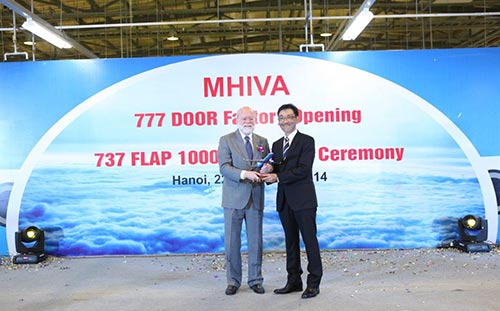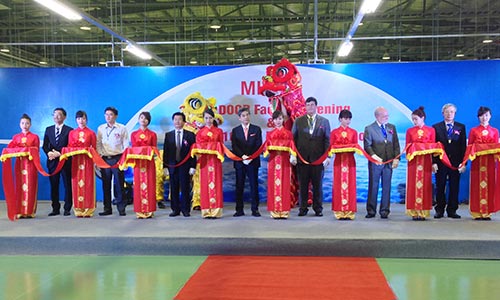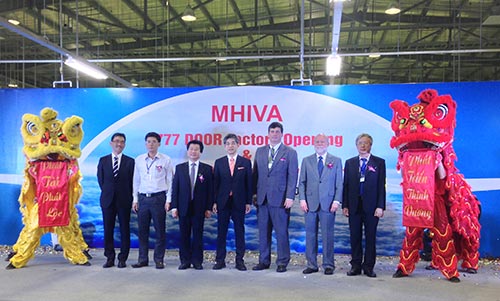MHIVA opens new factory to supply passenger doors for Boeing777

The firm also marked the shipment of its 1,000th inboard flap for the Boeing737 at the opening ceremony of the new factory.
“The MHIVA door factory opening and 1000th 737 inboard flap delivery milestones we celebrate today are recognition of the skilled local workforce and proven high quality manufacturing performance that MHIVA and Vietnam bring to the table,” said Skip Boyce, president of Boeing Southeast Asia. “This stringent requirement for high quality manufacturing capability will only continue to grow in importance as Boeing ramps up production rates to keep up with global aircraft demand.”

The newly completed factory, with the total capacity of 32 doors per month, has a building area of 6,500 square metres, which was constructed as an addition to MHIVA’s head office in the Thang Long Industrial Park (TLIP) on the outskirts of Hanoi. Initially the factory will only undertake structural assembly of passenger doors for the Boeing777, a task transferred from MHI’s Nagoya Aerospace Systems Works. Subsequently MHIVA will take full responsibility for the total assembly work of the passenger doors.

Boeing’s 777 family of jets has been well received by passengers, and as the air transport market’s leading large-size twinjet passenger aircraft more than 1,200 units have been produced since the first flight in 1994. MHI has been a risk-sharing partner in the development and mass production of the series, being responsible not only for passenger doors but also for aft fuselages. In 1993 the company delivered parts for the very first 777.
Production of inboard flap for the Boeing 737 has been undertaken at MHIVA’s existing factory with the total investment capital of $7 million since the facility was completed in 2009. Initially MHIVA only handled partial assembly work; later, production processes were gradually expanded, until today the company is responsible for total assembly capacity of 60 inboard flaps per month.
MHIVA was established by MHI in 2008 as one of various initiatives targeting the establishment of an efficient supply chain as a way of enhancing the company’s competitive strength.
MHI is presently undertaking numerous large-scale commercial aircraft projects – production of composite-material wing boxes for the midsize Boeing 787 passenger jet; production of the recently rolled-out MRJ (Mitsubishi Regional Jet), Japan’s first domestically developed passenger jet; and participation in the development and mass production of the 777X, successor to the Boeing 777 – and the company is taking steps to build up its production systems and expand production capacity.
What the stars mean:
★ Poor ★ ★ Promising ★★★ Good ★★★★ Very good ★★★★★ Exceptional
Latest News
More News
- Site clearance work launched for Dung Quat refinery upgrade (February 04, 2026 | 18:06)
- Masan High-Tech Materials reports profit: a view from Nui Phao mine (February 04, 2026 | 16:13)
- Hermes joins Long Thanh cargo terminal development (February 04, 2026 | 15:59)
- SCG enhances production and distribution in Vietnam (February 04, 2026 | 08:00)
- UNIVACCO strengthens Asia expansion with Vietnam facility (February 03, 2026 | 08:00)
- Cai Mep Ha Port project wins approval with $1.95bn investment (February 02, 2026 | 16:17)
- Repositioning Vietnam in Asia’s manufacturing race (February 02, 2026 | 16:00)
- Manufacturing growth remains solid in early 2026 (February 02, 2026 | 15:28)
- Navigating venture capital trends across the continent (February 02, 2026 | 14:00)
- Motivations to achieve high growth (February 02, 2026 | 11:00)
















 Mobile Version
Mobile Version